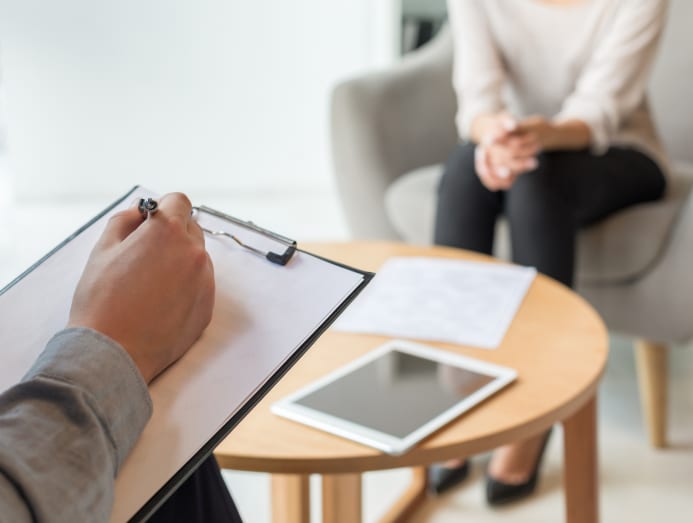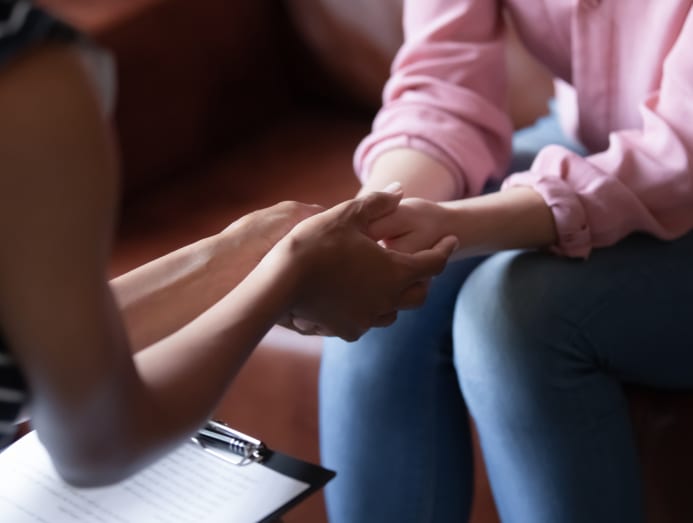Commentary: Can mental health apps replace face-to-face therapy?
SINGAPORE: The COVID-xix pandemic has taken a price on all of united states of america.
Each time a new phase or transition period rolls out, nosotros've had to grapple with isolation from our friends and family, hybrid work and school arrangements, and general uncertainties about the future.
The impact on the psychological wellbeing of our nation cannot be understated. A study by the Institute of Mental Wellness (IMH) between May 2022 and June 2022 indicated 13 per cent of participants reported symptoms of depression or feet during the COVID-19 pandemic.
IMH's helpline also received l per cent more than callers in 2020, compared to the same period in 2019.
Given the circumstances, information technology is unsurprising some are looking for more ways to support their mental wellbeing, including the use of mental health apps.
In fact, the use of such resource is getting more than popular and the Health Promotion Board (HPB) has rolled out an online portal, MindSG, with mental wellness resources curated past experts.
THE Attraction OF MENTAL Wellness APPS
At that place is a plethora of mental health apps that tin can be readily accessed or downloaded from app stores or the Internet.
Some focus on empowering individuals to manage their ain emotions. These provide various forms of support, ranging from automatic seize with teeth-sized pieces of information, to guides on how to develop diverse coping skills.

For instance, some provide step-past-step sound instructions on how to practise mindfulness meditations or assistance users pace their breathing when feeling overwhelmed.
Other apps guide users to place and challenge unhelpful thoughts. These may appeal to those uncomfortable with sharing their emotional vulnerabilities with others or desire support readily available at their fingertips. Their anonymity may also destigmatise the process of seeking aid.
Some fifty-fifty offer virtual psychotherapy or counselling sessions to those who prefer an individualised approach and existent-time interaction with professionals, just take concerns about going out in the pandemic. These may accept place over text messaging, telephone telephone call or video conferencing.
With a mobile penetration rate of over 100 per cent and relatively higher rates of smartphone usage among millennials in Singapore, it isn't difficult to imagine such apps appealing to a younger and technologically savvy population.
Would the Teaching Ministry consider doing away with the PSLE or implement afterward start times for schools to ease the pressure off students? We asked Minister of State for Instruction Sun Xueling these questions in CNA's Center of the Matter podcast.
Tin APPS Supersede THERAPY?
The apparent perks of such mental health apps then raise the question: Are they a replacement for confront-to-face psychotherapy, which aims to assist people manage troubling symptoms of emotional difficulties and support functionality and wellbeing?
Unfortunately, there is currently a lack of empirical evidence on the efficacy or effectiveness for many of these apps.
Whether apps tin replace face-to-face psychotherapy depends on what an individual hopes to achieve, the level of support they need, their current life circumstances, and barriers such equally fear of stigmatisation , time constraints and costs.
Have for case, Adam*, who initially constitute some relief using apps from the mental health challenges he was facing. He plant comfort in the anonymity and thought using such apps was better than doing null at all.
Nonetheless, his circumstances and stressors changed during the pandemic. He establish himself spending more time with quarrelsome parents and faced changes in piece of work demands. But he was unable to engage in usual coping strategies, like going to the gym and meeting friends for meals.
It became increasingly difficult to address his mental health difficulties on his own. Frustrated, he blamed himself for not being able to cope, especially since people claimed to have benefitted from these apps that were highly recommended online.
Adam soon realised he needed individualised support and structure to improve his mental health. While he initially contemplated virtual private therapy sessions, he decided confronting this, as his home surround and proximity to his family were non conducive.
This gave him the push button he needed to encounter an in-person therapist.

The initial transition to having to open up to his therapist was daunting, but he slowly constitute condolement and safety, setting the stage for his continued growth and recovery.
Every bit he gradually returned to work with the economy reopening, he institute it increasingly difficult to commit to regular therapy sessions.
Adam and his therapist both agreed to stop sessions as he was coping ameliorate and could return to using apps to maintain treatment gains.
DECIDING WHAT'Due south RIGHT FOR YOU
In deciding which platforms of mental health back up to engage, it is important to consider your ain needs and wants, and how offline or online resource can meet them.
What suited you in the past may not adapt you at present or in the futurity. It is perfectly normal to endeavor something new if current efforts have not been working out.
It isn't uncommon for individuals to use apps in between confront-to-confront sessions, especially if a professional assesses this may be helpful in the development or maintenance of coping strategies.
For instance, those beginning to larn relaxation skills may detect information technology less stressful to do so with an sound guide reminding them what to do, rather than memorising instructions. App reminders can too amend adherence to practising the skills outside of scheduled sessions.
That said, more than is not e'er better, every bit there are many different therapeutic approaches to addressing mental wellness difficulties. And then people may receive dissimilar or even conflicting information beyond various platforms or apps.
For case, to manage work-related anxiety, some apps may promote finding calm through relaxation exercises while others may encourage exposure to the anxiety to develop emotional tolerance. This difference in approach can exist confusing for users.
Ultimately, there is no ane-size-fits-all solution. Those unsure which platform best suits them may benefit from professional advice.
In a hyperconnected digital world, it is unsurprising that mental health apps have gained traction amidst users. If you already use apps and go along to find yourself in persistent or intense emotional distress, seeking out various mental wellness care providers located in the customs or healthcare institutions may be helpful.
As nosotros motion towards a "new normal", expect bumps along the style. It is important to treat yourself with compassion. Your emotional needs are valid, and they are what brand you human.
Allow yourself to seek the help you demand in whatever fashion or course that works.
*A pseudonym was used in this commentary.
Denise Lim and Jasmine Chang are clinical psychologists at the Constitute of Mental Health (IMH).
Mental health groups have seen a surge in calls since COVID-19 hitting. Who are the people tirelessly manning these helplines? Observe out on Heart of the Affair.
0 Response to "Commentary: Can mental health apps replace face-to-face therapy?"
Post a Comment